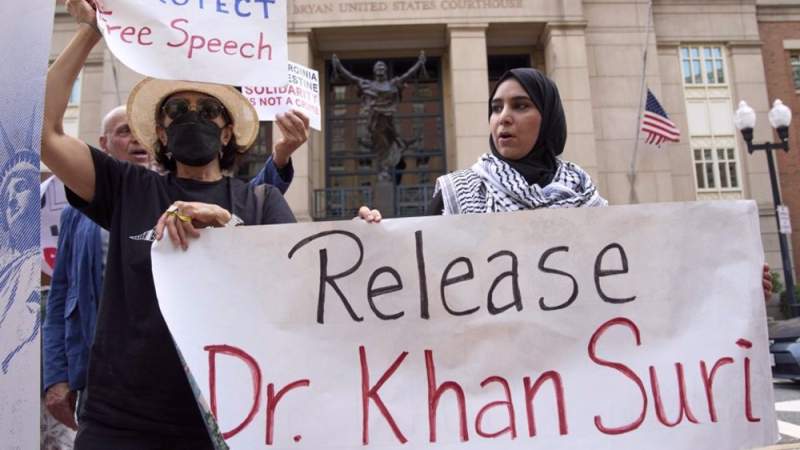Pro-Palestinian Georgetown Academic Ordered Released from Custody in Another Legal Defeat for Trump Admin.

News - World: A federal court has ordered the release of Dr. Badar Khan Suri, a Georgetown-affiliated scholar, marking a significant legal setback for the Trump administration in its broader crackdown on pro-Palestinian activism.
Dr. Khan Suri had been detained for eight weeks following his arrest by US Immigration and Customs Enforcement (ICE) agents -- an arrest civil rights attorneys say was retaliation for his constitutionally protected speech and personal associations.
The decision allows Dr. Khan Suri to return from Texas to Virginia, where he lives with his wife and three children and where his legal challenge against the constitutionality of his detention is ongoing.
‘Speaking out is not a crime’
“Speaking out about what’s happening in Palestine is not a crime,” said his wife, Mapheze Saleh, who was visibly emotional following the judge’s ruling.
“Let’s show the world that this country is still a place where people can and do express their beliefs without fear.”
Dr. Khan Suri, an Indian national and lawful visa holder, is married to a Palestinian-American US citizen.
Before his arrest, the couple was targeted online by blacklisting sites such as Canary Mission and CAMERA. On March 17, federal agents detained him outside his Virginia home and secretly transported him more than 1,500 miles away from his family and legal counsel.
Within four days, he was shuffled through five ICE facilities across three states, ultimately arriving at a Texas detention center.
There, he was placed in a cell with no bed and subjected to nearly constant noise from a television. Despite observing Ramadan, he was denied basic accommodations such as water and food for breaking his fast, and was issued a red “high-risk” uniform typically reserved for those considered severe security threats.
Legal, constitutional stakes
Eden Heilman, legal director at the ACLU of Virginia, described the arrest as “part of an extreme and unprecedented attack by this administration designed to punish students and academics for their views.”
“The Constitution protects us all -- regardless of citizenship -- from being targeted for political speech and family associations,” Heilman said.
Last week, a federal judge refused the Trump administration’s motion to either dismiss Dr. Khan Suri’s habeas corpus case or move it to Texas, thereby preserving jurisdiction in Virginia.
Pattern of retaliatory detentions
Dr. Khan Suri’s case reflects a broader pattern. Over the past two weeks, federal judges have also ordered the release of Mohsen Mahdawi, a student at Columbia University, and Rümeysa Öztürk, a PhD candidate at Tufts University. Both were arrested after criticizing the US support for Israeli atrocities in Gaza, according to their legal teams.
Astha Sharma Pokharel, an attorney at the Center for Constitutional Rights, called the ruling a “clear message” to federal authorities.
“You cannot arrest someone, rip them away from their family, and incarcerate them just for standing in solidarity with Palestinians and against the genocide in Gaza,” she said.
Nermeen Arastu, an associate professor at the CUNY School of Law, added that Dr. Khan Suri’s release “demonstrates the strength of his principles, the power of community organizing, and the impact of legal advocacy.”
She warned, however, that the case was also “a stark reminder of how vulnerable our rights become when government overreach is left unchallenged.”
Constitutional claims, legal representation
Dr. Khan Suri is challenging his arrest under the First Amendment, the Due Process Clause of the Fifth Amendment, and the Administrative Procedure Act.
While Dr. Khan Suri’s federal lawsuit proceeds in Virginia, a separate immigration case seeking his deportation, however, remains active in Texas, with a hearing scheduled for June 3.
He is represented by a coalition of legal organizations, including the ACLU of Virginia, the Center for Constitutional Rights, the HMA Law Firm, and the Immigrants and Non-Citizens Rights Clinic at CUNY School of Law.
The case emerged amid growing concern over the Trump administration’s use of immigration enforcement as a tool for political suppression.
Source: Press TV
-
10:04
Lebanese Health Ministry: One person was martyred as a result of an airstrike by the Israeli enemy targeting a vehicle in the city of Bint Jbeil, southern Lebanon
10:04
Almasirah correspondent in Sa’adah: A second civilian was injured by mortar shrapnel fired by the Saudi enemy army at the border district of Shada
10:03
Almasirah correspondent in Sa’adah: A second civilian was injured by mortar shrapnel fired by the Saudi enemy army at the border district of Shada
09:48
Almasirah correspondent in Sa’adah: A civilian was wounded after Saudi enemy artillery shelling targeted residential villages in the border district of Shada
09:37
Palestinian sources: Artillery fire by the Israeli enemy targets the northeastern area of Al-Bureij refugee camp in the central Gaza Strip





